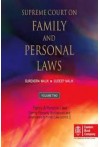- Author(s): Surendra Malik, Sudeep Malik
- Publisher: Eastern Book Company
- Edition: 2 Ed
- ISBN 13 9789351453819
- Approx. Pages 1898 + Contents
- Format Hardbound
- Approx. Product Size 24 x 18 cms
- Delivery Time 3-5 working days (within Kerala & South India) (Others 7-9 days)
- Shipping Charge Extra (see Shopping Cart)
......................................................................................................................................
Description
Arrangement of case law on Family and Personal Laws
The law governing Marriage, Divorce, Maintenance, Adoption, Guardianship and Custody of Children, Joint Family Property and Succession and Inheritance to property, whether by will or through intestate succession, is collectively called Family Law. In India since Family Law is a mix of secular law i.e. law which applies regardless of a person's religion or community, and personal laws i.e. laws which apply based on a person's religion or community, it is termed 'Family and Personal Laws'.
Article 44 of the Constitution envisions a Uniform Civil Code throughout the territory of India. The Supreme Court has repeatedly called upon the Government to enact suitable legislation to bring forth a Uniform Civil Code. Moreover, the Supreme Court has ruled that many important aspects of Family Law are uniformly applicable regardless of personal law, and that secular statutes like the Guardian and Wards Act, 1890 should be interpreted regardless of personal law. Furthermore, there are a number of striking similiarities in the grounds on which divorce may be sought under the (Christian) Divorce Act, 1869, the Parsi Marriage and Divorce Act, 1936, the Dissolution of Muslim Marriages Act, 1939, and the Hindu Marriage Act, 1955. The Law of Adoption is now governed for all communities by Rules made under the Juvenile Justice (Care and Protection of Children) Act, 2000. The Majority Act, 1875, the Guardian and Wards Act, 1890 and the Maintenance Provisions under Ss. 125-128 of the Criminal Procedure Code, 1973 are again secular law applicable irrespective of community. Thus, a careful examination of the existing law suggests that there is already a strong foundation for a Uniform Civil Code, and more and more the Supreme Court is refusing to give effect to Personal Laws that are not in consonance with Constitutional Values and interpreting secular law accordingly. The reader may see the rulings particularly under '1.3 Uniform Civil Code' in Vol. 1.
It is this very spirit that has been adopted as the guiding principle for arranging the case law on Family and Personal Laws. An attempt has been made to first give the law on all aspects from a secular perspective, which it is hoped may be of some use in drafting a Uniform Civil Code. The rulings which have been given here are either based on secular laws, or even when arising out of personal law adjudication, are such that they appear to be uniformly applicable.
......................................................................................................................................
Table of Contents
Bird's eye view
In Volume 1
1. Generally
2. Marriage, Divorce, Other Unions and Children
3. Adoption
4. Guardians and Wards
5. Maintenance and Financial Provision/Alimony/Palimony
6. Judicial Intervention/Family Courts/Judges/Officers
7. Conversion/Reconversion of Religion
8. Family Property, Succession and Inheritance
(8.1 Generally to 8.9 Intestate Succession and Escheat)
In Volume 2
8. Family Property, Succession and Inheritance
(8.10 Will to End)
9. Religious and Charitable Endowments/Trusts
10. Christian Law
11. Hindu Law
(11.1 Generally to 11.5 Divorce)
In Volume 3
11. Hindu Law
(11.6 Marriage and Divorce Statutes, Rules, Regulations, Norms, etc. to
11.9 Family Property, Succession and Inheritance)
In Volume 4
11. Hindu Law.
[11.9 Family Property, Succession and Inheritance (contd.) to End]
12. Muslim Law
13. Parsi Law
......................................................................................................................................
Author Details
Surendra Malik
Sudeep Malik

